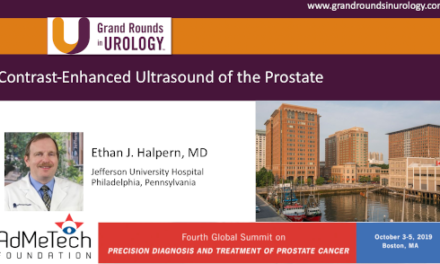
PCa Commentary | Volume 158 – October 2021
Posted by Edward Weber | October 2021
Therapy of the Primary Tumor in Newly Diagnosed Metastatic Hormone-Sensitive Prostate Cancer (mHSPC): To Treat or Not to Treat. That is the Question.
The previous PCa Commentary (Vol. 157) addressed the evolution of systemic therapy regimens in de novo metastatic hormone-sensitive prostate cancer (mHSPC), concluding by citing the remarkable outcome of treatment with the triplet combination of androgen suppression (ADT), chemotherapy, and relugolix—yielding a 2.5 year improvement in progression-free survival compared to the doublet ADT/docetaxel.
Overview: Should the Prostate Be Treated in Addition to Systemic Therapy?
The management of de novo metastatic prostate cancer is changing rapidly and there is growing interest in local treatment of the primary in these patients. Currently there is no consensus regarding ‘standard of care’. This lack places a responsibility for an informed discussion between patient and physician in men who present with this advanced stage. Choice of a management regimen needs consideration of the definition of ‘low disease burden;’ a patient’s tolerability for a prostatectomy or chemotherapy; and the trade-off between the benefit of surgery (avoidance of the complications of local progression) and surgical adverse effects (bladder outlet and ureteric obstruction) compared to, say, the efficiency and safety of a short course of radiation therapy employing stereotactic body radiation therapy (SBRT).
The biologic rationale for local treatment of the prostate is supported by the research showing
- that the primary tumor in the prostate secretes factors (oncosomes) into the blood that prepare a metastatic niche to receive and nourish circulating tumor cells;
- that destruction of cells in the prostate (by radiation or cryosurgery) releases internal antigens that prime T-cells to attack micro-metastases (the ‘abscopal’ effect); and
- the ‘back-and-forth tumor cell interchange between the primary tumor and the metastases.
The Outcomes of Two Studies Support the Trend of Treatment of the Primary:
1) Lumen et al in European Urology Open Science, 2021, state “Radiotherapy to the prostate prolongs survival of patients with low-volume, newly diagnosed metastatic prostate cancer,” and they report their retrospective study of 109 men, comparing the 2-year overall survival (OS) of men treated by radical prostatectomy (RP), IMRT radiation to at least the prostate and seminal vesicles (RT), and no local treatment (NLT). All men received androgen deprivation and, later in the trial, chemotherapy and a newer anti-androgen agent as well.
Low burden disease was defined as having less than 4 bone lesions and no visceral metastases. Imaging consisted of standard CT and bone scanning. [With general adoption of the newer PSMA/PET CTs and PYLARIFY, the incidence of this category of disease will increase.]
The trial tallied the local adverse effects (AEs) from surgery, AEs following radiation therapy, and AEs in patients having NLT. The local AEs were significantly lower in surgical patients compared to the RT and NLT cohorts, leading the authors to opine that “Surgical removal of the local tumor bulk appears to be the best way for reducing local complications.”
Their findings: The 2-year OS was not significantly different for RP and RT, 93% and 100; but for NLT the 2-year OS was 75%.
Their conclusion: In newly diagnosed low-burden metastatic disease, RP and RT yielded comparable outcomes.
2) Khondakar, Pinto, et al. (from the NIH) in Clinical Advances in Hematology and Oncology, July 2021, present “Emerging Role for Local Therapy in Oligometastatic Prostate Cancer.” [An excellent review.] Their discussion highlights the benefit and safety of metastases-directed therapy with SBRT directed to the prostate and to 5 or fewer metastatic lesions as compared to ‘standard of care’ systemic treatment. The men in the study had low-burden mHSPC.
Cited in this study are the two large, randomized trials (HORRAD and STAMPEDE) which, on subset analysis, found a 3-year overall survival of 81% in patients whose prostate and metastases were treated with SBRT compared with 73% of men receiving systemic ‘standard of care’. SBRT was found safe and not associated with long-term genitourinary adverse effects.
BOTTOM LINE:
The management of de novo metastatic prostate cancer is rapidly evolving, lending support to the concept that some patients with low-burden metastatic disease will benefit from treatment to both the primary and 3-5 sites of metastatic cancer.
Your comments and requests for information on a specific topic are welcome e-mail ecweber@nwlink.com.
Please also visit https://prostatecancerfree.org/prostate-cancer-news for a selection of past issues of the PCa Commentary covering a variety of topics.
“I want to thank Dawn Scott, Staffperson, Tumor Institute Radiation Oncology Group, and Mike Scully, Librarian, Swedish Medical Center, for their unfailing, timely, and resourceful support of the Commentary project. Without their help, this Commentary would not be possible.”
ABOUT THE AUTHOR
Edward Weber, MD, is a retired medical oncologist living in Seattle, Washington. He was born and raised in a suburb of Reading, Pennsylvania. After graduating from Princeton University in 1956 with a BA in History, Dr. Weber attended medical school at the University of Pennsylvania. His internship training took place at the University of Vermont in Burlington.
A tour of service as a Naval Flight Surgeon positioned him on Whidbey Island, Washington, and this introduction to the Pacific Northwest ultimately proved irresistible. Following naval service, he received postgraduate training in internal medicine in Philadelphia at the Pennsylvania Hospital and then pursued a fellowship in hematology and oncology at the University of Washington.
His career in medical oncology was at the Tumor Institute of the Swedish Hospital in Seattle where his practice focused largely on the treatment of patients experiencing lung, breast, colon, and genitourinary cancer and malignant lymphoma.
Toward the end of his career, he developed a particular concentration on the treatment of prostate cancer. Since retirement in 2002, he has authored the PCa Commentary, published by the Prostate Cancer Treatment Research Foundation, an analysis of new developments in the prostate cancer field with essays discussing and evaluating treatment management options in this disease. He is a regular speaker at various prostate cancer support groups around Seattle.




